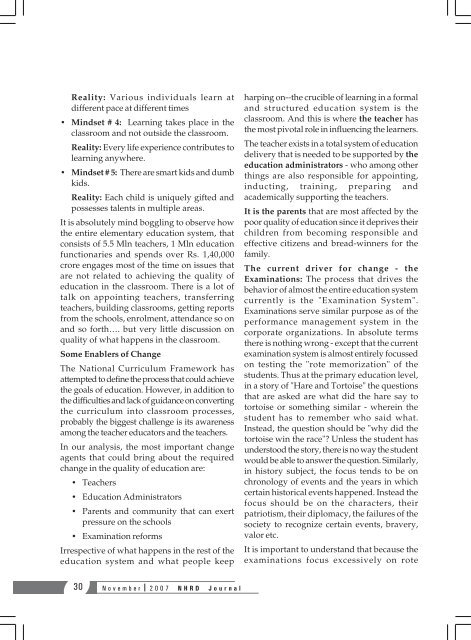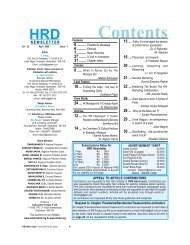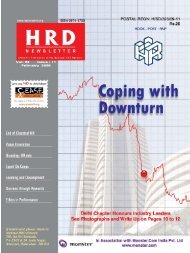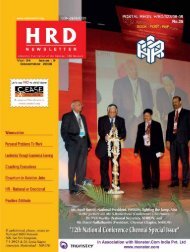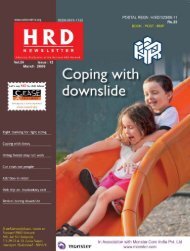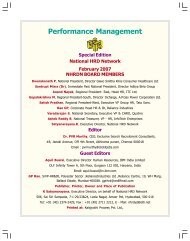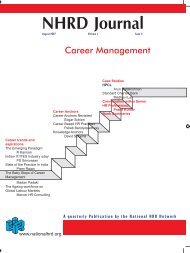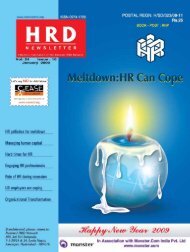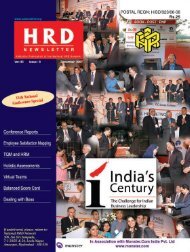NHRD Journal - National HRD Network
NHRD Journal - National HRD Network
NHRD Journal - National HRD Network
You also want an ePaper? Increase the reach of your titles
YUMPU automatically turns print PDFs into web optimized ePapers that Google loves.
Reality: Various individuals learn at<br />
different pace at different times<br />
• Mindset # 4: Learning takes place in the<br />
classroom and not outside the classroom.<br />
Reality: Every life experience contributes to<br />
learning anywhere.<br />
• Mindset # 5: There are smart kids and dumb<br />
kids.<br />
Reality: Each child is uniquely gifted and<br />
possesses talents in multiple areas.<br />
It is absolutely mind boggling to observe how<br />
the entire elementary education system, that<br />
consists of 5.5 Mln teachers, 1 Mln education<br />
functionaries and spends over Rs. 1,40,000<br />
crore engages most of the time on issues that<br />
are not related to achieving the quality of<br />
education in the classroom. There is a lot of<br />
talk on appointing teachers, transferring<br />
teachers, building classrooms, getting reports<br />
from the schools, enrolment, attendance so on<br />
and so forth…. but very little discussion on<br />
quality of what happens in the classroom.<br />
Some Enablers of Change<br />
The <strong>National</strong> Curriculum Framework has<br />
attempted to define the process that could achieve<br />
the goals of education. However, in addition to<br />
the difficulties and lack of guidance on converting<br />
the curriculum into classroom processes,<br />
probably the biggest challenge is its awareness<br />
among the teacher educators and the teachers.<br />
In our analysis, the most important change<br />
agents that could bring about the required<br />
change in the quality of education are:<br />
• Teachers<br />
• Education Administrators<br />
• Parents and community that can exert<br />
pressure on the schools<br />
• Examination reforms<br />
Irrespective of what happens in the rest of the<br />
education system and what people keep<br />
harping on--the crucible of learning in a formal<br />
and structured education system is the<br />
classroom. And this is where the teacher has<br />
the most pivotal role in influencing the learners.<br />
The teacher exists in a total system of education<br />
delivery that is needed to be supported by the<br />
education administrators - who among other<br />
things are also responsible for appointing,<br />
inducting, training, preparing and<br />
academically supporting the teachers.<br />
It is the parents that are most affected by the<br />
poor quality of education since it deprives their<br />
children from becoming responsible and<br />
effective citizens and bread-winners for the<br />
family.<br />
The current driver for change - the<br />
Examinations: The process that drives the<br />
behavior of almost the entire education system<br />
currently is the "Examination System".<br />
Examinations serve similar purpose as of the<br />
performance management system in the<br />
corporate organizations. In absolute terms<br />
there is nothing wrong - except that the current<br />
examination system is almost entirely focussed<br />
on testing the "rote memorization" of the<br />
students. Thus at the primary education level,<br />
in a story of "Hare and Tortoise" the questions<br />
that are asked are what did the hare say to<br />
tortoise or something similar - wherein the<br />
student has to remember who said what.<br />
Instead, the question should be "why did the<br />
tortoise win the race"? Unless the student has<br />
understood the story, there is no way the student<br />
would be able to answer the question. Similarly,<br />
in history subject, the focus tends to be on<br />
chronology of events and the years in which<br />
certain historical events happened. Instead the<br />
focus should be on the characters, their<br />
patriotism, their diplomacy, the failures of the<br />
society to recognize certain events, bravery,<br />
valor etc.<br />
It is important to understand that because the<br />
examinations focus excessively on rote<br />
30<br />
November 2007 <strong>N<strong>HRD</strong></strong> <strong>Journal</strong>


